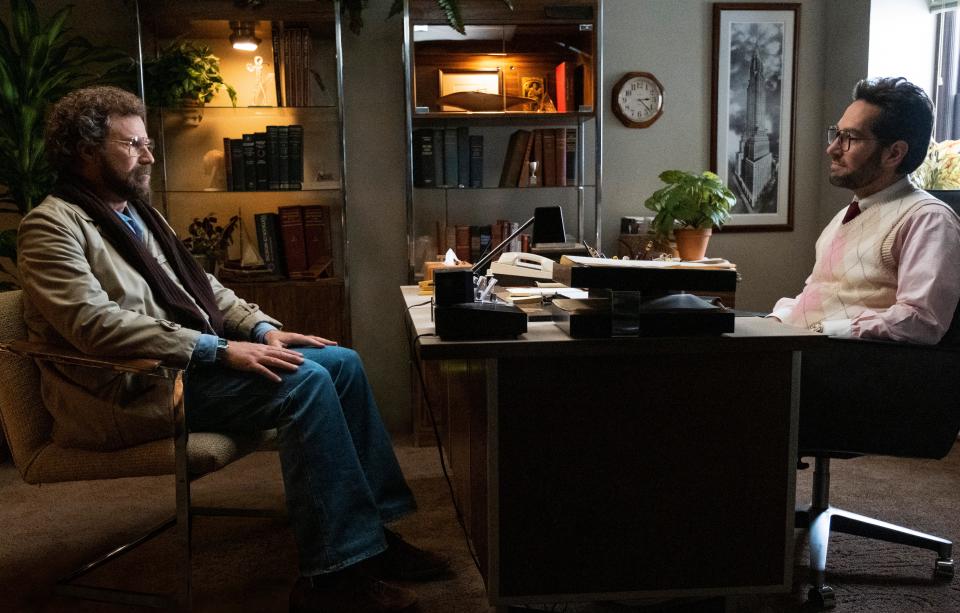Harrison Ford and Jason Segel's 'Shrinking': Is TV portraying therapy irresponsibly?
Hollywood loves therapy.
No, the stars may not be more prone to a therapist's couch than the rest of us. But producers are fond of incorporating it into TV shows.
Ever since CBS sitcom "The Bob Newhart Show" in 1972, the field of psychology has provided stories aplenty. Therapy can be central to the plot of the show, or just a part of the characters' lives. Think back to HBO's "The Sopranos" or "In Treatment," CW's "Crazy Ex-Girlfriend" or Apple TV+'s "Ted Lasso": Some of the biggest moments happened under the eyes of a mental health professional.
The latest to include therapy in its storytelling is Apple TV+'s "Shrinking," starring Jason Segel as a therapist going through a crisis in his own life, and written by Segel along with "Lasso" producers Bill Lawrence and Brett Goldstein.

More: Comedian Harrison Ford? In new tv series 'Shrinking' Ford and Jason Segel bring the laughs
But the realities of therapy are different than the drama Hollywood writers add to the sessions. And these series and movies can range from sensationalist to downright irresponsible.
"The classic media picture of a therapy session involves two people sitting across from each other; the patient talking while the therapist sits quietly, listening and writing notes," says John McGeehan, a licensed clinical social worker and founder of The Dorm, a mental health treatment program for young adults. "Therapy today can look so many different ways."
In "Shrinking," Segel's Jimmy Laird, grieving the loss of his wife, starts radically messing with the therapy formula by taking his patients on field trips, giving pointed advice and even inviting one young man to live in his guest house. He gets involved in his clients' personal lives, telling one (played by 'SNL' star Heidi Gardner) to leave her husband and taking another to scatter his mother's ashes.
At first, the other characters in "Shrinking," including his psychologist co-workers Paul (Harrison Ford) and Gabby (Jessica Williams), are aghast at Jimmy's behavior. But then they stop caring about the lines Jimmy crosses, seemingly forgiving him for major professional transgressions simply because the script demands it.
Instead, "Shrinking" gives Jimmy a pass in favor of telling a comforting story about friendship and overcoming grief. It sidesteps the thorny questions about trust and ethics in mental health care because it's funnier to watch Segel projectile vomit during a party than to engage with what he's done wrong. And it could give viewers the wrong idea about what a therapist is supposed to do.
"Licensed therapists are trained in a code of ethics and use that to navigate boundaries to avoid eroding trust," says McGeehan. And while the perception of the traditional "office" for therapy is changing with telemedicine and other therapeutic practices, sticking to those ethics sustains "the therapeutic relationship that has been built."
Jimmy isn't the first fictional therapist to cross this ethical line by getting too involved in his patients' lives. In HBO's "Big Little Lies," Celeste's (Nicole Kidman) therapist (Robin Weigert) tells her to leave her abusive husband, and how to do it. Robin's (Cobie Smulders) therapist (Kal Penn) on CBS' "How I Met Your Mother" begins dating her. In Netflix's "Gypsy," Naomi Watts plays a therapist who seeks out the friends and family of her clients for insidious relationships. Another recent Apple series, "The Shrink Next Door," is based on a true story of a psychiatrist (Paul Rudd) who psychologically abused and manipulated his patients.

It's debatable how much responsibility TV creators and filmmakers have when depicting mental health care. This is fiction, after all, and to make things interesting, the drama has to be heightened. If someone filmed actual therapy sessions, it would hardly be entertaining enough for TV. Still, pop culture affects our perception of the world around us, and patients risk walking into a practitioner's office expecting the kind of quick fixes fictional counseling often portrays.
"There is a tendency to present (patient/therapist) relationships as an instant “spark” rather than a nuanced, gradual evolution," McGeehan says. "Trust and rapport can take time, and that’s key in therapy."
Perhaps if Hollywood writers can't get mental health care exactly accurate, they could try a little harder to not to glorify the worst kinds of "caregivers."
Let Segel's Jimmy be as bad a therapist as they want. But don't let him off the hook for the harm he causes, either.
That's not good for anyone's mental health.
This article originally appeared on USA TODAY: 'Shrinking': Does Harrison Ford show portray therapy irresponsibly?
